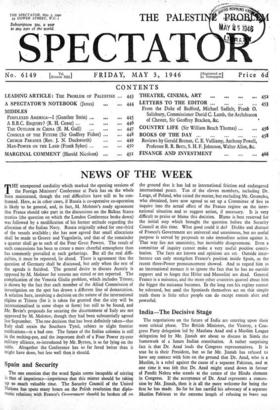NEWS OF THE WEEK
THE unexpected cordiality which marked the opening sessions of the Foreign Ministers' Conference at Paris has on the whole been maintained, though the real difficulties have still to be con- fronted. Here, as in other cases, if Russia is co-operative co-operation is likely to be general, and, in fact, M. Molotov's ready agreement that France should take part in the discussions on the Balkan States treaties (the question on which the London Conference broke down) was followed by a modification of his former attitude regarding the allocation of the Italian Navy. Russia originally asked for one-third of the vessels available ; she has now agreed that small allocations shall be made to Greece and Yugoslavia, and that of the remainder a quarter shall go to each of the Four Great Powers. The result of such concessions has been to create a more cheerful atmosphere than has commonly prevailed at such gatherings. But all the real diffi- culties, it must be repeated, lie ahead. There is agreement that the question of Germany shall be discussed, but only when the rest of the agenda is finished. The general desire to discuss Austria is opposed by M. Molotov for reasons not stated or not reported. The complication of the Venezia Giulia problem, which includes Trieste, is shown by the fact that each member of the Allied Commission of investigation on the spot has drawn a different line of demarcation. A solution here, involving a decision on the nature of the international regime at Trieste (for it is taken for granted that the city will be internationalised in some shape or form) has still to be found, and Mr. Bevin's proposals for securing the disarmament of Italy are not approved by M. Molotov, though they had been substantially agreed last September. The one decision that has been definitely taken—that Italy shall retain the Southern Tyrol, subject to slight frontier ratifications—is a bad one.. The future of the Italian colonies is still in the melting-pot, and the important draft of a Four Power 25-year military alliance, re-introduced by Mr. Byrnes, is so far lying on the table. Altogether the Conference has so far fared better than it might have done, but less well than it should.






























